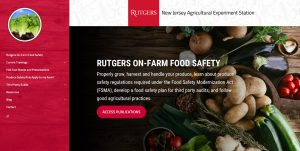Do you grow specialty crops and use organic practices? Meredith Melendez, who is an Agricultural Agent at Rutgers Cooperative Extension of Mercer County and Thierry Besancon, Weed  Specialist, Department of Plant Biology at Rutgers The School of Environmental and Biological Sciences are conducting a survey to assess weed pressure and management strategies. This research is conducted through an anonymous 23 question online survey. The survey should take less than 10 minutes to complete. Anyone who is certified organic, transitioning to certified organic or uses organic production practices is eligible to complete the survey. Results will be used to assess programmatic impacts and develop future outreach efforts. This survey will open from March 2018 to April 2018.
Specialist, Department of Plant Biology at Rutgers The School of Environmental and Biological Sciences are conducting a survey to assess weed pressure and management strategies. This research is conducted through an anonymous 23 question online survey. The survey should take less than 10 minutes to complete. Anyone who is certified organic, transitioning to certified organic or uses organic production practices is eligible to complete the survey. Results will be used to assess programmatic impacts and develop future outreach efforts. This survey will open from March 2018 to April 2018.
To access the survey please click HERE!
If you have any questions about the study or study procedures, you may contact myself at 930 Spruce Street, Trenton, NJ 08648 or Melendez@njaes.rutgers.edu or 609-989-6830.

